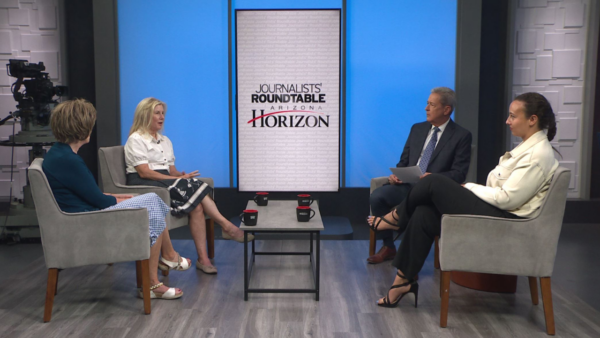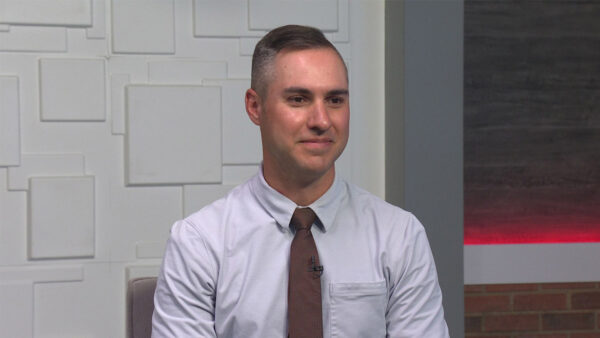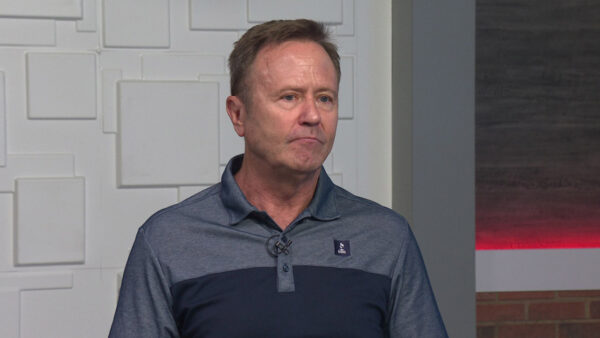Arizona State University’s Morrison Institute has released a new report on income in Arizona. It shows that Arizona lags behind the national average in income earned from dividends, interest and rental property as well as earned income. ASU Economist Tom Rex, the author of the report, will discuss his findings.
Ted Simons: A new report from ASU's Morrison Institute shows that Arizona lags behind the nation in per capita income in terms of money earned at the workplace, as well as for instance dividends, interest, and rental property. ASU economist Tom Rex is the author of the report. Good to see you again. Thanks for joining us. I want to get to this property income thing, but as far as per capita earnings just in general, we're not doing too well, are we?
Tom Rex: No. No. Arizona is 16% below the national average on per capita income now.
Ted Simons: And why is that do you think?
Tom Rex: It's because of a host of reasons. There's a lot of components to per capita income, and Arizonans below average frequently not by very much, but below average on almost every one of them. So instead of being able to point finger and say it's this one item that does it, it's in fact a full range of factors.
Ted Simons: As far as general per capita income, we're going to get new numbers coming up soon. Correct?
Tom Rex: Right.
Ted Simons: OK. But property income we've got the numbers now. Correct?
Tom Rex: We've got 2011 numbers in property, and the others. There's preliminary numbers only for the overall figure, and it shows 2012 wasn't really any different than 2011. So we haven't made any progress in the last year.
Ted Simons: We may ask you back when we get these updated numbers, especially in general terms of per capita income. Right now the best we can do is property income and the research there, there are different levels or different categories of property income. What are they?
Tom Rex: Property income, basically refers to individual savings whether they do it through bank account, whether they do it by buying stock, whether they buy real estate. All of those would fit into property income. And we're below average on property income by about the same amount as the overall. Which isn't a real surprise. If your populous is not making that much money, they're making less income than their counterparts around the country, they're going to have less money to invest in any of these other ventures. So that I think is the primary reason why property income is so low, is because our earnings are so low.
Ted Simons: I would think, and from your report it seemed to suggest urban areas you would see better at least property income results than you would in maybe rural areas. And yet it sounds like Maricopa County is still below the average for urban areas.
Tom Rex: It is. Yes. It is. It's better than almost- It's better than all the rest of the state, Maricopa County is the best in all the different measures of income. But it is still below in particular other large urban areas. There is a relationship with urban size, and measures like this. And so yes, it's not a problem that you can say it's strictly a rural problem in Arizona, because it's an urban problem as well.
Ted Simons: Do we see differences between Maricopa County, Pima county, Yavapai -- Sounded like Yavapai county was doing well. What are we seeing there?
Tom Rex: Yavapai does well in that particular measure because they have a fair number of rather affluent retirees. Maricopa County used to do better because it used to, relative to the size of the economy, have more relatively affluent retirees. We still have them, they're still moving in, but they're a drop in the bucket now compared to all the rest of the economy.
Ted Simons: And talk more about that. It seemed as though it would be difficult, the whole thing would be difficult for me to research, but as far as research is concerned, with so many people coming in part-time residents, folks who might be having a lot of net wealth to them, staying here for a certain amount of time, how do you balance those metrics? How do you figure out what's really going on?
Tom Rex: Well, the part-timers don't get counted in Arizona. They get counted wherever they spend most of their time where they declare their permanent residence to be. So they're not in the numbers any way, shape, or form. But the retirees that move here, people that retire and move to Arizona for retirement, they're a boost to the economy, most of them are fairly affluent, and that's why you get an example like you mentioned like in Prescott, where you've got fairly good numbers on that because they made their money elsewhere, so their earnings may well have been pretty good wherever they were living. They weren't subject to the lower conditions and Arizona. And then they bring that money with them when they retire.
Ted Simons: So talk about the economic impact of those sorts of folks, and again, how you can balance that. It seems like a moving target. You never know who's going to move here, the past few years it seems no one has been moving here.
Tom Rex: Well, yeah. The short-term cyclical conditions take precedent over everything else essentially. Even the more affluent people that were thinking of retiring, many of them saw such a huge drop during the recession in their savings through their investments and all, that they've had to back off and not think about retiring, not think about moving as soon as they might have expected. But we do know there's a large, large number of baby boomers who are just now, the fleeting edge of them are just hitting retirement age. And they will be in the coming years, Arizona will experience quite a bit of increase in the number of retirees moving here.
Ted Simons: From what we've seen in previous years, how do we rank in terms of western states per capita income in general, property income in particular?
Tom Rex: We're below average. We're better than a couple states like New Mexico, but we're below the average.
Ted Simons: And why is that?
Tom Rex: Well, there's a lot of reasons. We have first off relatively high proportions of retirees and children. They're not part of the work force, they're not earning income. So that's part of it there. Even though when you look at the over-- The working age population, we have a lower percentage, part of the labor force in Arizona. So you put that together, we have fewer percentage of the people earning money. Then for those that are earning money, the average wage is below average here. Partially because their job mixes toward lower wage jobs. Even if you're not working for a company, you're on your own. Proprietors' incomes are really low in Arizona. So you get the idea. It's just, pick up anything you look at, we're below average. And so when you accumulate all of those individual items, none of which on their own are that terribly significant, but you put them all together and there's nothing offsetting on the low end.
Ted Simons: All right. Well, Tom, not the most encouraging of news, but it's an interesting report nonetheless. Good to have you here.
Tom Rex: Thank you.
Tom Rex:Economist, Arizona State University;























